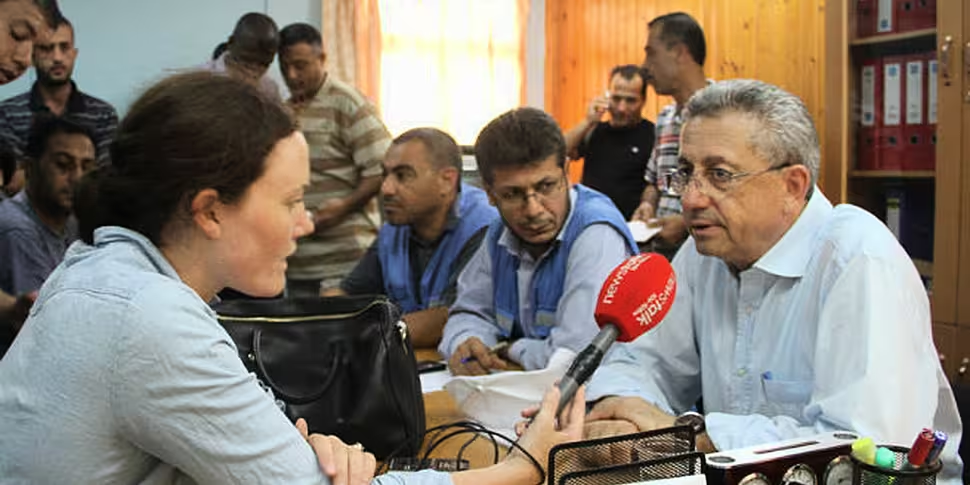“The demilitarisation of Gaza will never happen”, insists Palestinian delegate to talks in Cairo, Dr Mustafa Barghouti.
Dr Barghouti was speaking to Newstalk yesterday at the Egyptian border in Rafah, Gaza, where he had taken a break from “difficult” Egyptian brokered ceasefire talks with Israel.
Dr Barghouti also says the Palestinian delegation intends to take Israel to the International Criminal Court (ICC) for war crimes, despite long pursued heavy international pressure on the Palestinian Authority not to join the ICC for fear of escalating political tensions.
“We are determined to take them to the International Criminal Court, and we are pressuring President Abbas to sign the Rome Statute [the treaty that established the ICC]," said Dr Barghouti.
Israel is not a member of the ICC, but under the rules of the Rome Statute, any member is entitled to take a belligerent state to the court even if that enemy country is not a non-ratified signatory.
Palestine can apply for jurisdiction as a result of its successful application to “non-member observer status” at the United Nations. A status upgraded in November 2012, just days after the completion of ‘operation pillar of defence’ - the last intense Israeli incursion in Gaza.
The ICC can only intervene in situations where a state is deemed "unable" or "unwilling" to do so independently.
The UN Security Council has the power to trigger an investigation, but it is unlikely that it would execute this authority.
For its part, Israel is seeking a ‘full demilitarisation’ of the Gaza strip. This week it confirmed it has significantly weakened Hamas’ military power by destroying 32 Hamas-built ‘terror tunnels’, apparently used to transport weapons and artillery into Gaza.
Dr Barghouti denies the Gazan tunnels meant to attack Israel stating, “they were used as an act of “self defence”, to attack the army that was invading Gaza.
Although Hamas fires indiscriminately – a breach of international humanitarian law – Dr Barghouti claims, “the resistance ... did not try to kill Israeli civilians” and that the three people who died in Israel were killed “by accident”.

Newstalk correspondent Shona Murray in Gaza city following shelling in Al Shati refugee camp
According to Barghouti, “they [Israel] are linking lifting the siege of Gaza, and the reconstruction of what was destroyed here, with demilitarisation of the Palestinian resistance in Gaza, which will never happen”.
“We say, if they [Israel] want to demilitarise Gaza, they have to demilitarise Israel as well.
“Israel, now is saying to the world, that we will not allow the repair of infrastructure, unless the Palestinian’s surrender.
“This will never happen; the siege itself is an act of aggression.”

Kids in Khan Yunis, South Gaza, play with left over Israeli tanks
The Palestinian proposals in Cairo include the creation of an “international, independent, Palestinian port” and a safe sea “passage to Gaza, protected by the international community.”
In exchange, they are putting on the table, “the ceasefire; that there will be rockets and no attacks on Israel”.
In return for the cessation of rocket activity, Palestine’s negotiators want the siege of Gaza lifted.
In the long term, it is also calling for an end to the occupation of the Palestinian Territories; “the route of this problem is the occupation; it has been the longest in modern history”, but want assurances for now, that the naval, air and land blockade – in place since Hamas wrestled control of the Gaza strip in 2007 – is no more subjected to the “political Israeli mood”.
“Today they let things pass, tomorrow they don’t.
“Today they let coffee and spaghetti in to Gaza today, but they’re not allowing cement, construction materials, water or the creation of the desalination plant. Without desalination, Gaza is going to die of thirst. Or pollution.
“There is no drinkable water here. Water is either completely salinated, or polluted, or absent.
“We want a free port, a free airport - free from Israeli intervention, free passage between the West Bank and Gaza, the release of all the prisoners that were rearrested after being released.
"In return we will ensure there are no rocket attacks, that’s for sure; now there are no rockets.”
In Gaza, although there had been numerous stop-start ceasefires in recent weeks, Gazans appear more trusting that this 72-hour agreement will hold.
Fishermen are making their way out to sea, and today, a trickle of families braved the journey back to their towns, preparing themselves for the worst; expecting to find a pile of rubble where their homes once stood.
Dr Barghouti confirms that in the short term, movement around Gaza will remain uninterrupted: “I’m not sure about a political agreement this week, and I’m not sure, but I’m almost sure that the ceasefire will be extended.”
Amid all the political posturing, Gazan civilians have paid with their lives.

Six-year-old Mahlda, paralysed after six hours under rubble. Mother and sister dead
The city of Rafah resembles the scene of an earthquake; mosque, apartment buildings, businesses, beauty salons and shopping centres all reduced to rubble.

Ahmed, aged 7 in Al Shifa hospital, Gaza city. One leg amputated, the other filled with shrapnel. Chest and arms also filled with shrapnel
“They destroyed the infrastructure, they killed so many people and they could not occupy Gaza.
“The resistance was very strong, and the people will not turn against their own resistance.”









